八年级英语上册重点词组与句型归纳
人教版八年级上册英语各单元重点形容词短语句型
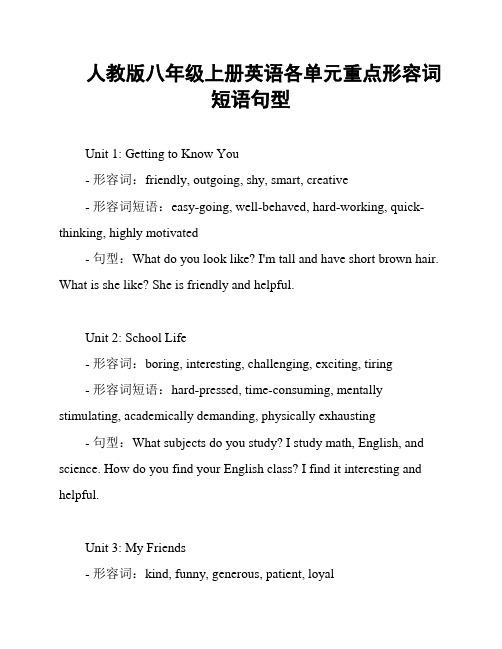
人教版八年级上册英语各单元重点形容词短语句型Unit 1: Getting to Know You- 形容词:friendly, outgoing, shy, smart, creative- 形容词短语:easy-going, well-behaved, hard-working, quick-thinking, highly motivated- 句型:What do you look like? I'm tall and have short brown hair. What is she like? She is friendly and helpful.Unit 2: School Life- 形容词:boring, interesting, challenging, exciting, tiring- 形容词短语:hard-pressed, time-consuming, mentally stimulating, academically demanding, physically exhausting - 句型:What subjects do you study? I study math, English, and science. How do you find your English class? I find it interesting and helpful.Unit 3: My Friends- 形容词:kind, funny, generous, patient, loyal- 形容词短语:always there for me, full of humor, never let me down, extremely caring, incredibly supportive- 句型:Do you have close friends? Yes, I have a few close friends. What do you like about them? I like their sense of humor and their loyalty.Unit 4: Hobbies and Interests- 形容词:exciting, relaxing, enjoyable, fascinating, addictive- 形容词短语:highly engaging, incredibly satisfying, deeply captivating, incredibly addictive, extremely challenging- 句型:What are your hobbies? My hobbies are reading and playing sports. How do you feel when you engage in these activities? I find them relaxing and enjoyable.Unit 5: Festivals and Celebrations- 形容词:colorful, festive, joyful, traditional, memorable- 形容词短语:rich in culture, culturally significant, highly anticipated, deeply rooted, widely celebrated- 句型:What festivals do you celebrate? I celebrate Chinese New Year and Christmas. How do you celebrate them? We have family gatherings, eat special food, and exchange gifts.Unit 6: Health and Fitness- 形容词:healthy, fit, energetic, active, balanced- 形容词短语:physically fit, mentally alert, emotionally stable, nutritionally balanced, holistically healthy- 句型:How do you keep fit? I exercise regularly and eat a balanced diet. How do you feel when you are healthy and fit? I feel energetic and active.Unit 7: Travel and Adventure- 形容词:adventurous, thrilling, breathtaking, cultural, picturesque- 形容词短语:filled with excitement, heart-pounding, awe-inspiring, culturally enriching, visually stunning- 句型:Do you like traveling? Yes, I love traveling and exploring new places. How do you describe your travel experiences? They are adventurous and culturally enriching.Unit 8: Environment and Pollution- 形容词:clean, polluted, green, sustainable, eco-friendly- 形容词短语:environmentally conscious, pollution-free, resource-efficient, eco-friendly practices, sustainable development - 句型:How do you protect the environment? I reduce, reuse, and recycle. What do you think about pollution? I think pollution is harmful to both humans and the environment.。
人教版新目标八年级英语上册各单元重点单词和短语梳理归纳
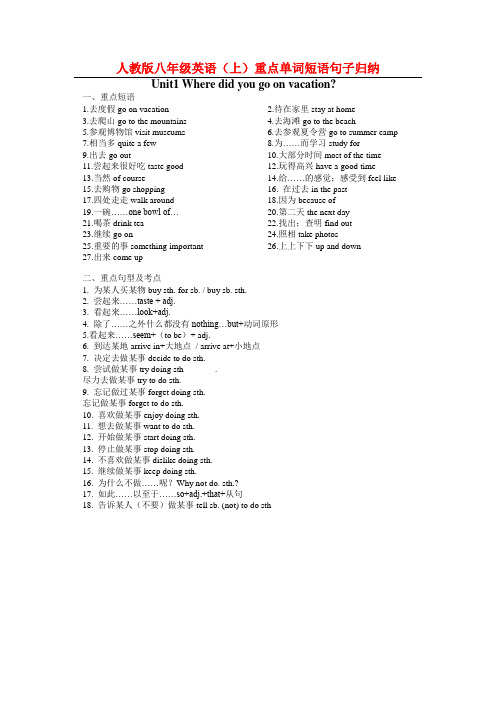
人教版八年级英语(上)重点单词短语句子归纳Unit1 Where did you go on vacation?一、重点短语1.去度假go on vacation2.待在家里stay at home3.去爬山go to the mountains4.去海滩go to the beach5.参观博物馆visit museums6.去参观夏令营go to summer camp7.相当多quite a few8.为……而学习study for9.出去go out 10.大部分时间most of the time 11.尝起来很好吃taste good 12.玩得高兴have a good time13.当然of course 14.给……的感觉;感受到feel like 15.去购物go shopping 16. 在过去in the past17.四处走走walk around 18.因为because of19.一碗……one bowl of… 20.第二天the next day21.喝茶drink tea 22.找出;查明find out23.继续go on 24.照相take photos25.重要的事something important 26.上上下下up and down27.出来come up二、重点句型及考点1. 为某人买某物buy sth. for sb. / buy sb. sth.2. 尝起来……taste + adj.3. 看起来……look+adj.4. 除了……之外什么都没有nothing…but+动词原形5.看起来……seem+(to be)+ adj.6. 到达某地arrive in+大地点/ arrive at+小地点7. 决定去做某事decide to do sth.8. 尝试做某事try doing sth .尽力去做某事try to do sth.9. 忘记做过某事forget doing sth.忘记做某事forget to do sth.10. 喜欢做某事enjoy doing sth.11. 想去做某事want to do sth.12. 开始做某事start doing sth.13. 停止做某事stop doing sth.14. 不喜欢做某事dislike doing sth.15. 继续做某事keep doing sth.16. 为什么不做……呢?Why not do. sth.?17. 如此……以至于……so+adj.+that+从句18. 告诉某人(不要)做某事tell sb. (not) to do sthUnit 2 How often do you exercise?一、根据汉语写短语。
八年级英语上册第一单元语法知识点归纳
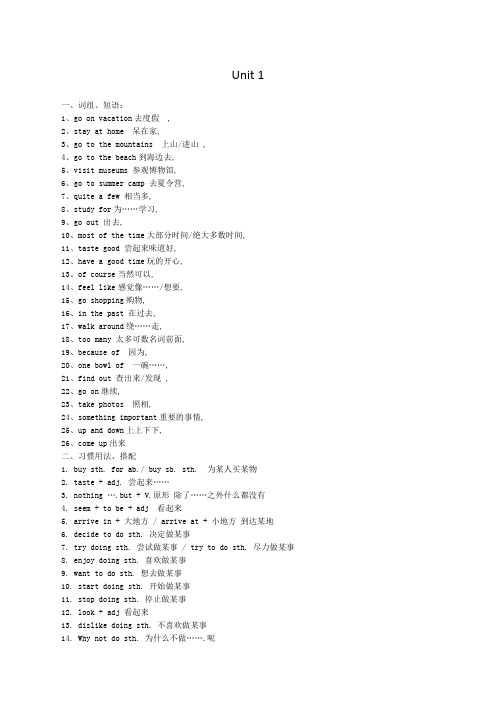
Unit 1一、词组、短语:1、go on vacation去度假 ,2、stay at home 呆在家,3、go to the mountains 上山/进山 ,4、go to the beach到海边去,5、visit museums 参观博物馆,6、go to summer camp 去夏令营,7、quite a few 相当多,8、study for为……学习,9、go out 出去,10、most of the time大部分时间/绝大多数时间,11、taste good 尝起来味道好,12、have a good time玩的开心,13、of course当然可以,14、feel like感觉像……/想要,15、go shopping购物,16、in the past 在过去,17、walk around绕……走,18、too many 太多可数名词前面,19、because of 因为,20、one bowl of 一碗……,21、find out 查出来/发现 ,22、go on继续,23、take photos 照相,24、something important重要的事情,25、up and down上上下下,26、come up出来二、习惯用法、搭配1. buy sth. for ab./ buy sb. sth. 为某人买某物2. taste + adj. 尝起来……3. nothing ….but + V.原形除了……之外什么都没有4. seem + to be + adj 看起来5. arrive in + 大地方 / arrive at + 小地方到达某地6. decide to do sth. 决定做某事7. try doing sth. 尝试做某事 / try to do sth. 尽力做某事8. enjoy doing sth. 喜欢做某事9. want to do sth. 想去做某事10. start doing sth. 开始做某事11. stop doing sth. 停止做某事12. look + adj 看起来13. dislike doing sth. 不喜欢做某事14. Why not do sth. 为什么不做…….呢15. so + adj + that + 从句如此……以至于……16. tell sb. not to do sth. 告诉某人不要做某事17. keep doing sth. 继续做某事18. forget to do sth. 忘记去做某事 / forget doing sth 忘记做过某事三、重点句子1. Where did you go on vacation 你去哪儿度假的1这是一个由疑问副词where引导的特殊疑问句;Where用来询问地点或场所,用于句首,其后跟一般疑问句;如:Where are you from Where does he live2go on vacation“去度假”He will go on vacation with his family. 他要和家人一起度假;解析 vacation v'ken n 假期 = holidayon vacation 在度假 take a vacation 去度假 winter vacation 寒假 summer vacation 暑假①I have a lot of _______________every year . vacation②— Where did Sarah go on vacation— She went to America.A.on vacationB. take a vacationC. is on vacationD. is for vacation2、Did you go with anyone你和别人一起去的吗这是一个一般过去时的一般疑问句;当含有实义动词的一般过去时的陈述句变为一般疑问句时,需借助助动词did,此时后面的实义动词应用原形;其句型结构为“did+主语+动词原形+其它”,肯定回答为“Yes,主语+did”,否定回答为“No,主语+didn′t”·基本用法pron. anyone 任何人,相当于anybody,通常用在否定句、疑问句或条件从句中;如: I wont tell anyone I saw you here. 我不会告诉任何人我在这儿见过你;Why would anyone want that job 为什么会有人想要那份工作呢知识拓展---同类词Some - any- no- every-指人 someone 有人 anyone 任何人 anybody no one 没有人nobody everyone 人人 everybody指物 something 某物 anything 任何事 nothing 没有事everything 一切事指地点 somewhere 某地 anywhere 任何地方 nowhere 无处,没有地方 everywhere 到处注意:1由some-, any-, no-, every-构成的符合不定代词作主语时,都作单数看待,其谓语动词用第三人称单数形式;2不定代词若有定语修饰,该定语要置于其后,作后置定语;如:Id like something to drink. 我想要些喝的;Is there anything interesting in the book 这本书中有有趣的东西吗小结:解析1someone smwn pron 某人anyone eniwn pron 任何人 everyone evriwn pron 每人,人人 my uncle 看望了我的叔叔visit是及物动词,意为“拜访;探望”,后接表示人的名词或代词; visit还可以意为“参观;游览”,后接表示地点的名词;a.I visited my grandmother last week. 上周我去______了我的外婆;b. you want to visit Shanghai 你想______上海吗c.拓展:visitor意为“参观者;游客”;These visitors come fromanything special 买特别的东西;P21buy及物动词,意为“买;购买”;其过去式为______;拓展:buy sth. for sb.=buy sb. sth. 意为“给某人买某物”; My uncle_____ _____a bike.= My uncle_____ _____for me.2)anything不定代词,意为“某事;某件东西”,主要用于疑问句或否定句中;a.Do you want to buy anything for me cant say anything about it.3)anthing special表示“特别的东西”,形容词修饰不定代词时后置;Is there________ ________in this book这本书里有新的内容吗, did you go anywhere interesting哦,你去有趣的地方了吗P21本句是did开头的一般疑问句2anywhere用作副词,意为“在任何地方”;eg:Did you go anywhere during the summer vacation 辨析:anywhere与somewhereanywhere意为“在任何地方”,常用于否定句和疑问句中; eg:I cant find it anywhere.somewhere意为“在某处;到某处”,常用于肯定句中; eg:I lost my key somewhere near here. took quite a few photos there.我们在那里拍了不少照片;P2take photos 意为“照相;拍照”; eg:We______ ______on the Great Wall.我们在长城上照了相;辨析:quite a few与quite a littlequite a few 意为“很多;不少”,修饰可数名词复数;quite a little 意为“很多;不少”,修饰不可数名词;a. He stays here for _____ _____ _____days.is _____ _____ _____water in the bottle瓶子.6. I just stayed at home most of the time to read and relax. 我大部分时间只是待在家里读书休息; P2most of the time意为“大部分时间”,其中most为代词,意为“大部分;大多数”拓展most of…意为“……中的大多数”,它作主语时,谓语动词取决于most of后所修饰的名词;of us_____begoing to the park. 我们大多数人要去公园;b. Most of the food_____gobad. 大部分的食物都变质了;7.Everything tasted really good所有的东西尝起来真的很好吃P3taste在此为系动词,意为“尝起来”,其后接形容词构成系表结构;a.The food tastes really great.食物尝起来棒极了;8. Did everyone have a good time大家都玩得很开心吗P3have a good time = enjoy oneself = have fun 玩得开心 + doingeg: We had a good time visiting the the Great Wall. = We enjoyed ourselves visiting the the Great Wall.= We had fun visiting the the Great Wall.did you like it 你觉得它怎么样P3How do/did you like……意为“你觉得……怎么样”,用来询问对方的观点或看法,相当What do you think of……eg: How do you like your new job = _____ _____ _____ _____ your new jobyou go shopping 你们去购物了吗P3go shopping意为“去购物;去买东西”,同义短语为do some shopping.eg: I usually go shopping on Sundays.我通常星期天去购物;拓展:“go+doing”形式表示“去做某事”,常用于表达从事某一体育活动或休闲活动;go skating 去滑冰go hiking 去远足 go sightseeing 去观光 go fishing 去钓鱼 go swimming 去游泳go boating 去划船went to a friends farm in the countryside with my family.我和家人一起去了乡下一个朋友的农场;P3a friend’s farm是名词所有格形式;一般情况下,表示“有生命的人或物”的名词后面加s,表示所属关系;eg:The red bike is Alices. 那辆红色的自行车是爱丽斯的;拓展:名词所有格的构成:1单数名词词尾加s ,复数名词词尾没有s,也要加sthe girl ‘s pen女孩的钢笔 women’s shoes女鞋 on Children’s Day2复数名词以s结尾的只加the students’ reading room学生阅览室 Teachers’ Day教师节3如果两个名词并列,并且分别有s,则表示“分别有”;只后一个名词有一个s,则表示“共有”:John’s and Kate’s rooms. 约翰和凯特各自的房间; Lily and Lucy’s father. 莉莉和露西的爸爸同一个爸爸; 4表示无生命的名词一般以...of...构成短语,表示所有关系;a map of China一幅中国地图 the name of the story那个故事的名字12.Still no one seemed to be bored. 即使这样仍然没有人看起来无聊;P31seem意为“好像;似乎;看来”;eg:Everything seems easy.一切似乎很容易;拓展 a. seem+adj. “看起来……”; You seem happy today.你今天看起来很高兴;b. seem+to do sth. “似乎,好像做某事”; I seem to have a cold.我似乎感冒了;=It seems that I have a cold.c. It seems/seemed+从句“看起来好像…;似乎…”;It seems that no one believes you.看起来好像没有人相信2辨析:bored与boringa. bored意为“厌烦的;感到无聊的”,一般在句中修饰人;b. boring意为“无聊的;令人厌烦的”,一般在句中修饰事或物;eg:a. I’m ______with what he said.我对他说的话厌烦极了;b. I find the story very_______.我发现这个故事太无聊了;二Section B1. What activities do you find enjoyable 你发现什么活动让人快乐P5enjoyable形容词,意为“愉快的;快乐的”;Im sure we will have an enjoyable vacation. 我确信我们将会有一个愉快的假期;2. I arrived in Penang in Malaysia this morning with my family. 今天早上我和家人到达了马来西亚的槟城;P5arrive不及物动词,意为“到达”;arrive in表示到达较大的地方,如国家、省、市等;arrive at表示到达较小的地方,如机场、商店、广场、村庄等;注:地点副词home,here,there前介词省略辨析:①arrive in+大地点 / arrive at+小地点②get to +地点③reach+地点eg:I 到达 school at 8:00 oclock yesterday.3. …so we decided to go to the beach near our hotel…因此我们决定到旅馆附近的海滩上去;P5 decide to do sth.意为“决定做某事”; eg: They _____ ______ ______the museum.他们决定去参观博物馆;拓展:decide后常跟“疑问词+动词不定式”做宾语;He can’t decide when ______ _____leave 他不能决定何时动身;4. My sister and I tried paragliding.姐姐和我尝试了滑翔伞运动;P5try此处用作及物动词,其后常接名词、动名词或不定式,意为“尝试;试图,设法;努力”She is trying my bicycle.她正在试骑我的自行车;拓展:try也可用作名词,意为“尝试”,常用短语“have a try”,意为“试一试”;I want to have a try.我想试一试;辨析:try doing sth. / try to do sth.1try doing sth. 尝试做某事,表示一种尝试、做做看的想法,不一定付出很多努力;2try to do sth.尽力、设法去做某事,表示想尽一切办法要把事情办成,强调付出努力设法去完成;a. I ______ ______ him, but no one answered. 我试着给他打电话了,但没有人接听;b. Im ______ ______ ______ English well. 我正尽力把英语学好;5. I felt like I was a bird. It was so exciting 我感觉自己就像一只小鸟;太刺激了P51feel like意为“给……的感觉;感受到”;其后常接从句; eg: He feels like he is swimming. 他感觉像在游泳一样;拓展:feel like还可意为“想要……”,其后可接名词、代词或动名词;即: feel like sth. 想要某物 feel like doing sth. 想要做某事 eg:Do you feel like a cup of tea now 你现在想要一杯茶吗Do you feel like ______ take a walk in the park with me 你想跟我在公园散步吗2辨析:exciting与excitedexciting 意为“令人兴奋的,使人激动的”, 一般修饰某物; excited 意为“感到兴奋的,激动的”, 一般修饰某人; Eg: story is_________exciting, excited .told me the_______exciting, excitednews.was_______exciting, excitedto see the singer.6.There are a lot of new buildings now…现在有许多新的建筑物……P5building 可数名词,意为“建筑物;楼房”;build 动词,“建造,建筑” built,built,The workers built many tall buildings in our school last year.7. I wonder what life was like here in the past. 我想知道在这儿过去的生活是什么样的;P5 wonder此处是及物动词,意为“想知道;琢磨”;其后常接who, what, why等疑问词引导的宾语从句;Eg: wonder _______________. 我想知道那个男孩是谁;A. the boy is who B. who the boy is 2. I wonder what they were doing here.我想知道他去哪里了;8.I really enjoyed walking around the town. 我真的很喜欢在镇上到处走走; P51enjoy及物动词,意为“喜爱;欣赏;享受……的乐趣”,其后接名词,代词或动名词作宾语;a. Do you enjoy your job 你喜欢你的工作吗b. I enjoy reading books. 我喜欢读书;enjoy doing sth.喜欢做某事拓展: enjoy oneself =have a good time = have fun 玩得开心 + doing sth.2)walk around 意为“四处走走”;Hes just walking around the village.他只是在村庄里随便走走;9. What a difference a day makes 一天的变化有多大呀 P5difference可数名词,意为“差别,差异”;其形容词形式为different,意为“不同的;有差异的”; Eg: a. What is the difference between this book and that bookb. My schoolbag is different from yours. be different from 意为“与……不同”10.We wanted to walk up to the top , but then it started raining a little so we decided to take the train.P51want to do sth. 意为“想要做某事”;2start doing sth. 意为“开始做某事”,同义短语:start to do sth. Eg: Tom started learning English last year.3a little 意为“一点儿”,在句中修饰动词、形容词或副词;也可以修饰不可数名词;Eg: a. I can draw a little, but only as a hobby. ______________________________b. Its a little cold outside. ______________________________c. He can speak a little English. ______________________________4)take the train意为“乘火车”,take在此意为“乘坐”;waited over an hour for the train because there were too many people. 因为人太多,所以我们等了一个多小时的火车;P51wait for意为“等候”,其后可接人或物; Tom was waiting for a bus over there.2over介词,意为“多于;超过” ,相当于more than; Eg : My father is over 40 years old.Here are over eight hundred students in our school.3 too many意为“太多”,其后接可数名词复数; He always has too many questions to ask me. 辨析:too many + 可数名词复数意为“太多... ”too much + 不可数名词意为“太多... ”much too + 形容词 /副词意为“太... ”eg:I have homework to do today. The weather today is ______ _______ cold. because of the bad weather, we couldnt see anything below.而且因为坏天气,我们也没能看到下面的任何景色P5辨析:because of与becausea. because of意为“因为,由于”,后可接名词短语、代词或动名词,不能接句子; He lost his job because of his age.b. because意为“因为”,引导状语从句,即接句子; I didnt buy the shirt because it was too expensive.13.My father didnt bring enough money…我爸爸没带足够的钱……P51辨析:bring与takebring意为“带来;拿来”, 指从别处带到说话者所在地;take意为“拿走;带走”, 指从说话者所在地带到别处去;2enough 意为“足够的,充分的”1.用来修饰形容词或副词,一般置于被修饰词之后;2.用来修饰名词时放在名词之前;Eg:a. We have enough time to do our homework.b. The box is big enough.14.…because we forgot to bring an umbrella…因为我们忘了带雨伞;P6辨析:forget to do sth.与forget doing sth.forget to do sth. 意为“忘记要做某事事情还没做”eg: Dont forget to close the window. forget doing sth. 意为“忘记做过某事事情已经做过了” eg: I forget closing the window. 15. About one hour later, we stopped and drank some tea. 大约一小时后,我们停下来喝了些茶;P6 1one hour later 一小时后;一小时前__________________2stop动词,意为“停止;中断”,过去式_________,现在分词__________;3drink及物动词,意为“喝;饮”;还可以作名词,意为“饮料”;16. Did you dislike anything 你不喜欢什么东西吗P7dislike意为“不喜欢;厌恶”,其后可接名词、代词或动名词形式作宾语;Eg:a. Mary ______ the hamburgers. 玛丽不喜欢汉堡包;b. I _____ ______ computer 我不喜欢玩电脑游戏;17. Why not 为什么不带呀P8why not意为“为什么不呢”,一般用在疑问句中,表示提建议;why not后面需跟动词原形;注“Why not + 动词原形”相当于“Why dont you+ 动词原形”a. Why not go to the party with me =Why dont you go to the party with me为什么不和我一起去参加聚会呢_____ take a walk = _____ ______ _____ take a walk 为什么不去散步呢in our class took a bag with some food and water. 我们班上的每一个人都随身带了装有食物和水的提袋;P8with介词,意为“具有;带有”; 此处介词短语with some food and water作bag的后置定语;拓展:with作介词时的其他用法:a.“和……一起’ I often go to school ______ my friend. 我经常和朋友们一起去上学;b. 以手段、材料,用工具, Cut the apple with a knife. 用刀切苹果;19. My legs were so tired that I wanted to stop. 我的双腿太累了以至于我都想停下来;P8so…that… / such…that…如此…以致引导的结果状语从句so+adj./adv.+that…Eg:1. He is ____lovely a boy____we love him very much.2.The little boy is so young that he can’t go to school.20. 常用的感叹句的结构:1What +adj.+ 复数名词 / 不可数名词+主语+谓语2What +a/an+adj.+可数名词单数+主语+谓语3How +adj. +a/an+可数名词单数+主语+谓语4How+adj./adv. +主语+谓语eg: an interesting book it is = How interesting a book is 那本书多么有趣啊clever girl she is3. _____clever a girl she isjobs they have donewater it is D. Howthe dog is C. Where D. How21. My classmates told me to keep going, so I went on. 我的同学告诉我坚持往前走,因此我便继续前进了P81tell sb. notto do sth. 意为“告诉某人不要做某事;The teacher ______ ______ ______ ______ the window just now. 老师刚才告诉我们擦窗户;2keep doing sth. 意为“继续做某事,一直做某事”;She______ ______ TV for two hours last night. 昨晚她持续看了两个小时的电视;23.Everyone jumped up and down in excitement. 大家都兴奋地跳起来;P8up and down 意为“上上下下;来来回回”,在句中作状语;Eg:They looked me ______ ______ ______. 他们上上下下打量我;He walks______ ______ ______ in the room. 他在房间里来回走动;22. 反身代词:myself , ourselves, yourself , yourselves, himself, herself, itself, themselves.作动词或介词的宾语:经常在enjoy, teach, hurt, buy, introduce, dress, kill等动词和by, for, to, of等介词后作宾语;一年主考宾语回自身He is teaching himself English.她在自学英语;She was talking to herself.她自言自语;He lives by himself in the country.他独自住在乡下;1)Help yourself 请随便吃吧/请自己去取吧2)2 Make yourself at home 别客气3)make yourself heard /understood. 使你的话被人听得见/理解4)4 teach oneself 自学=learn by oneself5)5 by oneself 独自6)for oneself 为自己;替自己7 enjoy oneself 玩的愉快8 dress oneself 给自己穿衣, little, a few, a little :的用法few, a few修饰可数名词,little, a little修饰不可数名词;few, little具有否定意义,表示“几乎没有”,a few, a little具有肯定意义,表示“一些”;He has little money, but few students want to lend money to him.他几乎没有钱,但是几乎没有学生想借钱给他;There is a little milk and a few apples left in the fridge.冰箱里还有一些牛奶和一些苹果;。
八年级上册英语unit1词组和重点句型
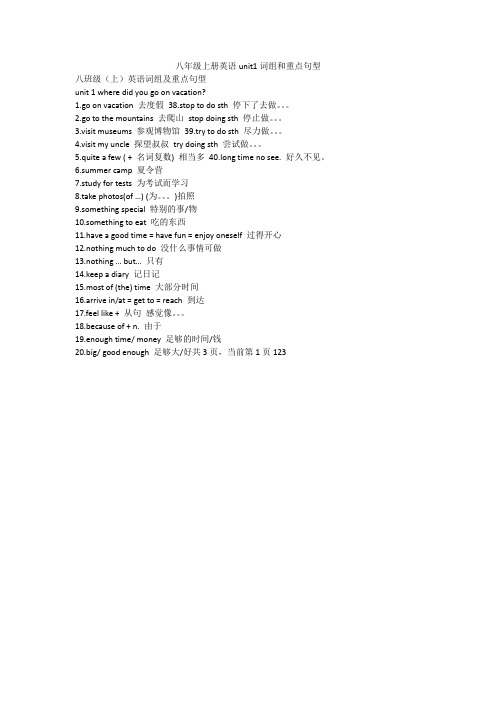
八年级上册英语unit1词组和重点句型八班级(上)英语词组及重点句型unit 1 where did you go on vacation?1.go on vacation 去度假38.stop to do sth 停下了去做。
2.go to the mountains 去爬山stop doing sth 停止做。
3.visit museums 参观博物馆39.try to do sth 尽力做。
4.visit my uncle 探望叔叔try doing sth 尝试做。
5.quite a few ( + 名词复数) 相当多40.long time no see. 好久不见。
6.summer camp 夏令营7.study for tests 为考试而学习8.take photos(of …) (为。
)拍照9.something special 特别的事/物10.something to eat 吃的东西11.have a good time = have fun = enjoy oneself 过得开心12.nothing much to do 没什么事情可做13.nothing … but… 只有14.keep a diary 记日记15.most of (the) time 大部分时间16.arrive in/at = get to = reach 到达17.feel like + 从句感觉像。
18.because of + n. 由于19.enough time/ money 足够的时间/钱20.big/ good enough 足够大/好共3页,当前第1页123。
八年级上册英语重点短语及句型总结
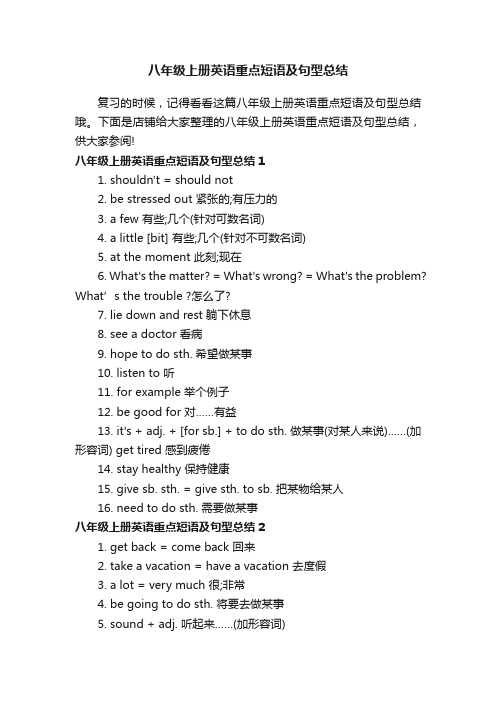
八年级上册英语重点短语及句型总结复习的时候,记得看看这篇八年级上册英语重点短语及句型总结哦。
下面是店铺给大家整理的八年级上册英语重点短语及句型总结,供大家参阅!八年级上册英语重点短语及句型总结11. shouldn't = should not2. be stressed out 紧张的;有压力的3. a few 有些;几个(针对可数名词)4. a little [bit] 有些;几个(针对不可数名词)5. at the moment 此刻;现在6. What's the matter? = What's wrong? = What's the problem? What’s the trouble ?怎么了?7. lie down and rest 躺下休息8. see a doctor 看病9. hope to do sth. 希望做某事10. listen to 听11. for example 举个例子12. be good for 对……有益13. it's + adj. + [for sb.] + to do sth. 做某事(对某人来说)……(加形容词) get tired 感到疲倦14. stay healthy 保持健康15. give sb. sth. = give sth. to sb. 把某物给某人16. need to do sth. 需要做某事八年级上册英语重点短语及句型总结21. get back = come back 回来2. take a vacation = have a vacation 去度假3. a lot = very much 很;非常4. be going to do sth. 将要去做某事5. sound + adj. 听起来……(加形容词)6. sound like + n. 听起来像……(加名词)7. have a good time = have fun = enjoy oneself 玩得愉快8. show sb. sth. = show sth. to sb. 把某物给某人看9. want to do sth. = would like to do sth. 想要做某事10. plan to do sth. 计划做某事11. spend sometime [in] doing sth. 花时间做某事12. need to do sth. 需要做某事13. ask sb. about sth. 询问某人某方面的事情14. go shopping 去购物15. leave for 离开去某地八年级上册英语重点短语及句型总结31. as for 至于;关于2. how many 多少(针对可数名词)3. how much 多少(针对不可数名词)4. of course = sure 当然;确信5. look after = take care of = care for 照顾;照看6. a lot of = lots of = plenty of 许多;大量7. every day 每一天8. every night 每晚9. hardly ever 几乎不10. be good for 对……有益11. be good for one's health 有益健康12. try to do sth. 尝试做某事13. get good grades 取得好成绩14. help sb. [to] do sth. 帮助某人做某事15. kind of 有点16. want [sb.] to do sth. 想要(某人)做某事17. keep in good health 保持健康18. No two men think alike. 人心各异。
人教版初中英语八年级上册课本重点短语和句型
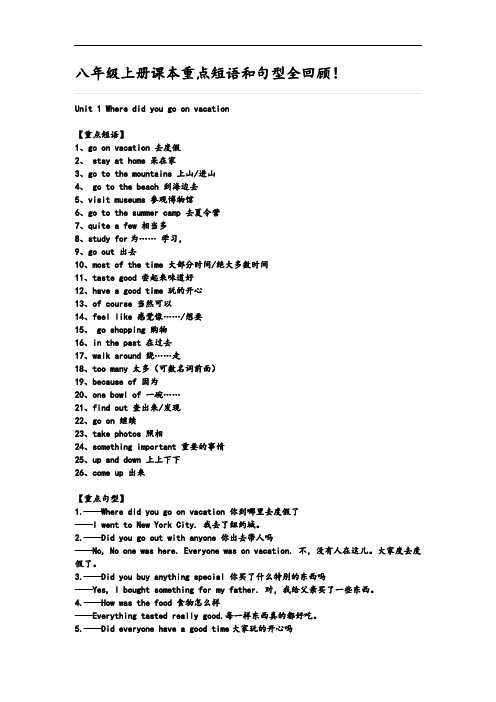
八年级上册课本重点短语和句型全回顾!Unit 1 Where did you go on vacation【重点短语】1、go on vacation 去度假2、 stay at home 呆在家3、go to the mountains 上山/进山4、 go to the beach 到海边去5、visit museums 参观博物馆6、go to the summer camp 去夏令营7、quite a few 相当多8、study for为……学习,9、go out 出去10、most of the time 大部分时间/绝大多数时间11、taste good 尝起来味道好12、have a good time 玩的开心13、of course 当然可以14、feel like 感觉像……/想要15、 go shopping 购物16、in the past 在过去17、walk around 绕……走18、too many 太多(可数名词前面)19、because of 因为20、one bowl of 一碗……21、find out 查出来/发现22、go on 继续23、take photos 照相24、something important 重要的事情25、up and down 上上下下26、come up 出来【重点句型】1.——Where did you go on vacation 你到哪里去度假了——I went to New York City. 我去了纽约城。
2.——Did you go out with anyone 你出去带人吗——No, No one was here. Everyone was on vacation. 不,没有人在这儿。
大家度去度假了。
3.——Did you buy anything special 你买了什么特别的东西吗——Yes, I bought something for my father. 对,我给父亲买了一些东西。
人教版八年级英语上册所有重点单词、短语和句型全汇总
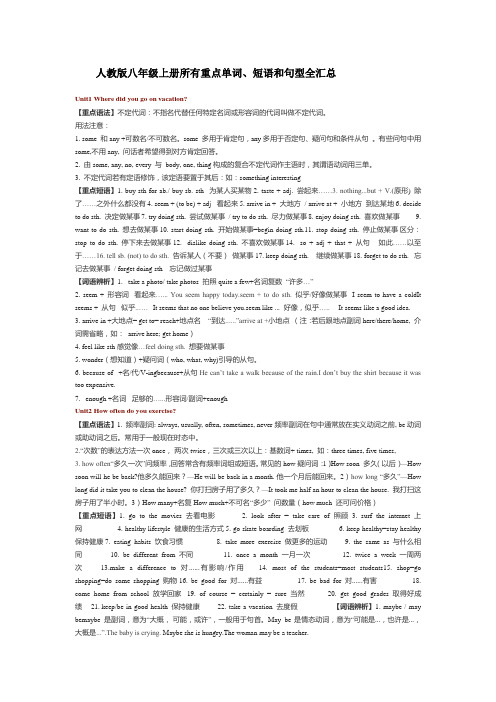
人教版八年级上册所有重点单词、短语和句型全汇总Unit1 Where did you go on vacation?【重点语法】不定代词:不指名代替任何特定名词或形容词的代词叫做不定代词。
用法注意:1. some 和any +可数名/不可数名。
some 多用于肯定句,any多用于否定句、疑问句和条件从句。
有些问句中用some,不用any, 问话者希望得到对方肯定回答。
2. 由some, any, no, every 与body, one, thing构成的复合不定代词作主语时,其谓语动词用三单。
3. 不定代词若有定语修饰,该定语要置于其后:如:something interesting【重点短语】1. buy sth for ab./ buy sb. sth 为某人买某物2. taste + adj. 尝起来……3. nothing...but + V.(原形) 除了……之外什么都没有4. seem + (to be) + adj 看起来5. arrive in + 大地方/ arrive at + 小地方到达某地6. decide to do sth. 决定做某事7. try doing sth. 尝试做某事/ try to do sth. 尽力做某事8. enjoy doing sth. 喜欢做某事 9. want to do sth. 想去做某事10. start doing sth. 开始做某事=begin doing sth.11. stop doing sth. 停止做某事区分:stop to do sth. 停下来去做某事12. dislike doing sth. 不喜欢做某事14. so + adj + that + 从句如此……以至于……16. tell sb. (not) to do sth. 告诉某人(不要)做某事17. keep doing sth. 继续做某事18. forget to do sth. 忘记去做某事/ forget doing sth 忘记做过某事【词语辨析】1. take a photo/ take photos 拍照quite a few+名词复数“许多…”2. seem + 形容词看起来…... You seem happy today.seem + to do sth. 似乎/好像做某事 I seem to have a coldIt seems + 从句似乎..…. It seems that no one believe you.seem like ... 好像,似乎….. It seems like a good idea.3. arrive in +大地点= get to= reach+地点名“到达......”arrive at +小地点(注:若后跟地点副词here/there/home, 介词需省略,如:arrive here; get home)4. feel like sth 感觉像…feel doing sth. 想要做某事5. wonder(想知道)+疑问词(who, what, why)引导的从句。
英语八年级上册第一单元重点短语和句型

英语八年级上册第一单元重点短语和句型英语八年级上册第一单元重点短语和句型一、重点短语:1.be from 来自于2.be good at 擅长3.be interested in 对.感兴趣4.be sure of 对.有把握5.be worried about 担心6.be different from 与.不同7.be similar to 与.相似8.be famous for 因.而出名9.be made of 由.制成10.be made in 在.制造11.be made from 由.制成12.be made up of 由.组成13.be known for 因.而闻名14.be popular with 受.欢迎15.be famous as 作为.而出名16.be used for 用于17.be used to 习惯于18.be interested in 对.感兴趣19.be sure to 一定会20.be afraid of 害怕21.be proud of 为.而自豪22.be angry with 对.生气23.be happy with 对.满意24.be surprised at 对.感到惊讶25.be pleased with 对.感到高兴26.be worried about 担心27.be strict with 对.要求严格28.be strict in 对.要求严格29.be strict about 对.要求严格30.be strict to 对.要求严格31.be strict on 对.要求严格32.be strict for 对.要求严格33.be strict at 对.要求严格34.be strict in 对.要求严格35.be strict of 对.要求严格36.be strict over 对.要求严格37.be strict through 对.要求严格38.be strict until 对.要求严格39.be strict when 对.要求严格40.be strict where 对.要求严格41.be strict while 对.要求严格42.be strict with regard to 对.要求严格二、重点句型:1.Where are you from? 你来自哪里?2.Where does he come from? 他来自哪里?3.I’m good at playing basketball. 我擅长打篮球。
- 1、下载文档前请自行甄别文档内容的完整性,平台不提供额外的编辑、内容补充、找答案等附加服务。
- 2、"仅部分预览"的文档,不可在线预览部分如存在完整性等问题,可反馈申请退款(可完整预览的文档不适用该条件!)。
- 3、如文档侵犯您的权益,请联系客服反馈,我们会尽快为您处理(人工客服工作时间:9:00-18:30)。
Unit 5 Can you come to my party
重点词组与句型归纳
1. come to the party 参加聚会
2. on Saturday afternoon 在星期六的下午
3. study for a test为测验而准备
4. go to the doctor = see a doctor 去看医生
go to the concert 去听音乐会
go to the baseball match 去看棒球比赛
go to the mall 去商业街
5. have / take a piano lesson 上一堂钢琴课
6. much too + adj. 太,过于
7. too much + (uncountable noun) 太多
8. finish the geography project 完成地理作业
9. soccer practice 足球训练
have tennis training 进行网球训练
10. look for 寻找
11. find out 找到,弄清楚,查明
12. be (go) on vacation 度假
13. join sb.加入某人(的行列)
14. a football match 足球比赛
15. be (keep) quiet 保持安静(keep + 形容词“保持某状态”)
keep +(sb.) + doing 使(某人)不停地做某事”
keep sth. 保存某物,饲养某物
16. a culture club 文化俱乐部
17. “给某人打电话”的几种说法:
call sb.( up), phone sb.(up)
phone to sb., telephone sb.(up)
telephone to sb., ring sb.(up)
give sb. a ring, give sb. a phone
make a telephone (call) to sb.
18. have to 不得不,必须
19. the day after tomorrow 后天
20. discuss a science report 讨论科学报告
21. Thanks for asking me. = Thanks for inviting me.
= Thanks for having. = Thanks for your invitation.
谢谢你的邀请
22. the day before yesterday 前天
23. on / at weekends 在周末
24. on weekdays 在平日/工作日 on , in , till
25. the whole day 整天
26. --Can you come to my birthday party?
--Sure, / Certainly, / Yes, I'd love to.
--Sorry, / I'm sorry, I can't. I have to …
--I'd love to. But I have to …
27. --What's today ? --It's Friday the 14th.
28. next week 下一周
29. this week 这一周
30. the day after tomorrow 后天
31. I have too much homework(to do) this weekend.
本周末我有太多家庭作业(要做)。
32. Can you come over to my house Wednesday evening to discuss the science report?
星期三晚上,你能来我家讨论这份科学报告吗?
一. 翻译下列短语及句子。
1. I’d love to 6. 后天
2. Can you come to my party? 7. 校队
3. go to the doctor 8. 过来
4. have a piano lesson 9. 谢谢你的邀请
5. What’s th e date today? 10. 帮他姐姐看孩子
二. 从A、B、C、D四个选项中选出正确答案。
1.“Can you help me my English? “”.
A. with; with pleasure
B. for; with pleasure
C. with; a pleasure
D. for; a pleasure
2.“ I’m sorry I have broken your cup .” “”
A. You are welcome
B. It’s all right
C. Not at all
D. It is no matter
3. “Would you like to join us in basketball?”“but I’m afraid I have to study for my science test.”
A.I wouldn’t
B. I’d love to
C. I’d like
D.I don’t like it
4. Both of his parents died of illness so he support his family at the age of 14
A. must
B. should
C. could
D. had to
5. May 12th is Xiao Ming’s birthday. He us to his birthday party.
A. asks
B. invites
C. makes
D. tells
6. Thanks your help, and now I have made great progress in my English.
A. to
B. with
C. for
D. by
7.“Can you go to the movie with us on Sunday?”“Of course.is it?”“5:00 in the afternoon.”
A. Where
B. What time
C. How soon
D. When
8. The poor lady had to go out for food a cold morning.
A. in
B. at
C. on
D. during
9. The big star on our national flag the Party.
A. stands up
B. stands for
C. instead of
D. mean
10. is made in Guangzhou.
A. All kinds of bicycle
B. This kind of bicycles
C. All kinds of bicycles
D. Bicycle of this kind
11. “Have you got e-mail address?”“Oh, yes. Mine is wjb80@ yahoo. com.”
A. the
B. an
C. a
D. /
12. Mrs. Liu teaches English. We like class very much.
A. me; his
B. me; her
C. us; his
D. us; her
13. Our school is only walk from here.
A. five- minute
B. five minute’s
C. five minutes
D. five minutes’
14. I don’t like the color of the T-shirt. Would you show me one?
A. other
B. the other
C. another
D. others
15. me carefully, boys and girls. Can you me?
A. Listen to; hear from
B. Hear; listen to
C. Hear; hear
D. Listen to; hear。
